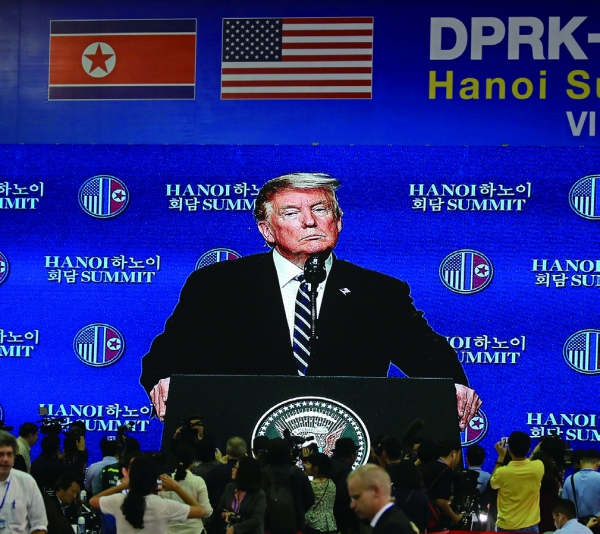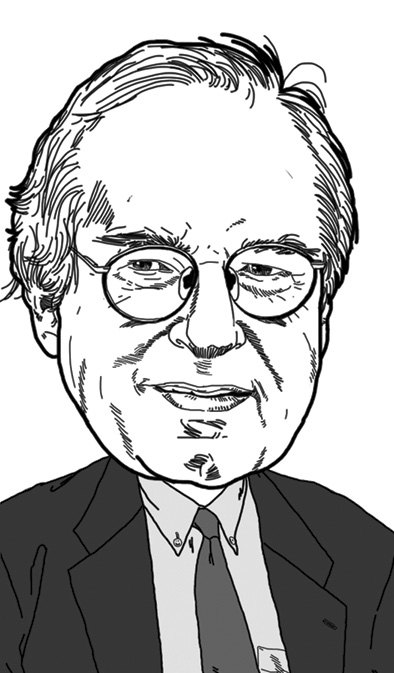트럼프와 김정은의 2차 정상회담을 실망스럽거나 좌절됐다고 묘사하지만 사실 실패된 것이다. 진짜 실패는 트럼프 대통령이 약속의 대가로 양보를 하며 서명한 것이 깨진 것이다. 북한의 핵 프로그램은 어떠한 협정에도 절대 굴하지 않는 김정은 일가의 사고 방식에 아주 깊게 뿌리내리고 있다.
김태우 전 통일연구원 원장은 “트럼프가 거짓 비핵화를 피했다”고 말했다. “우리는 정말 나쁜 스몰딜을 걱정했다.” “우리는 북한에 대한 제재를 완화해주고 핵시설을 보유할까봐 정말 걱정했다.” 만일 정상회담이 정말로 실패한 것이라면 미국의 협상단들은 다음에 어떤 일이 생기는가를 알아야 한다.
부시대통령 시절 국가안보회의에서 근무한 빅터 차는 실무진에서 파탄이 나지 않도록 준비해야 한다고 말했다. 트럼프는 회담 전 좀 더 많은 진전을 이루기 위해 협상단에게 권한을 부여했어야 한다. 협상단 또한 아무것도 얻지 못할 수도 있다.

그러나 10여년의 보수정권이 집권한 후에 거의 2년여 전에 대통령으로 당선된 진보적인 문재인 대통령은 그의 임기를 위태롭게 하는 역풍을 맞고 있다. 문 대통령은 일본의 식민통치에 항거한 3·1절 100주년 기념식에서 정상회담의 결과를 홍보할 수 있는 아주 적절한 시기에 곤혹스럽게도 연설문을 수정해야만 했다.
이성윤 터프츠대 플레처법학·외교대학원 교수는 문 대통령에게는 힘든 하루였다고 말했다. 이 교수는 문 대통령이 기가 꺾인 상황에 처했다고 말했다. 문 대통령은 자신을 재조명하며 ‘한반도의 비핵화’, ‘남북화해’, ‘자주독립’을 자축하는 행사를 계획했다. 또한 문 대통령 지지자들은 ‘김정은은 위대한 지도자’이며 ‘양키 고홈’을 외쳤을 것이다.
한미동맹 보호를 주장하는 보수세력에 민감한 문 대통령은 좌파들이 미군 철수를 주장하는 상황에서 미국과 좋은 관계를 유지하도록 조심해야 할 것이다.
“북한은 한미동맹의 간극을 벌리려고 합니다.” “그들의 궁극적인 목적이 한미동맹을 파괴하는 것이며 대다수 사람이 김정은의 마지못해하는 타협에 화가 나며 분개합니다.” 라고 김태우 전 원장은 말했다.
사실 트럼프-김정은 정상회담이 결렬된 후 3일 만에 한미 국방 관계자들은 가상의 적을 공격하는 한미 합동군사훈련을 대대급으로 축소한다고 발표했다. 즉 ‘동맹’으로 불리는 군사훈련이 지난 6월 싱가포르에서 열린 미북 정상회담 후 트럼프가 중단했던 대규모 워게임 훈련을 대체하게 된다.
정상회담 후 트럼프는 단독 대규모 군사훈련에 1억 달러가 소요된다며 올해 대규모 군사훈련을 축소하고 한국이 더 많은 비용을 부담해야 한다고 밝혔다.
이와 관계없이 로버트 에이브람스 주한미군사령관과 박한기 한미연합사 부사령관은 공동성명서에서 한미동맹을 유지하고 강화하기 위해 그와 같은 훈련이 중요하다고 말했다.
군사력을 강조한다고 해서 한국과 미국이 북한과 접촉하는 것을 끝낸다는 뜻은 아니다.
3년 전 한국으로 탈북한 런던 주재 북한대사관에서 근무했던 태영호 공사는 미국 사람들이 북한 사람들에게 직접 말해야 한다고 말했다. 정상회담이 진행되는 동안 태 공사는 더 많은 북한 사람들이 남한 방송을 몰래듣고 탈북자들로부터 남한에서의 생활이 훨씬 더 좋다는 것을 들어야 한다고 말했다.
만일 이러한 얘기가 터무니없다고 생각한다면 마찬가지로 김정은이 핵공격을 명령할 것이라는 것도 터무니없는 생각이다. 핵탄두의 최대 몸값은 협상 카드로 쓸 때이다. 그렇다면 왜 비핵화에 대해 걱정하나? 김정은은 협상 실무진들이 타협을 기대했기에 더 이상 핵으로 위협할 수 없다. 그러한 관점에서 베트남에서 자랑스럽게 기대했던 하노이 정상회담의 결렬, 즉 하노이선언의 실종이 정상회담의 시대를 마감했다. 트럼프는 미 국내에서 많은 문제를 안고 있는 것 같고 김정은은 지난 9월 문 대통령의 평양 방문에 대한 답례로 서울 답방을 계속 요청하는 문 대통령의 제안에 별로 관심이 없을지도 모른다.
현재 폐간된 파이스턴이코노믹리뷰의 심재훈 전 서울지국장은 더 이상 정상회담은 없을 것으로 내다봤다. “김정은은 북한 주민들을 먹여 살리기 위해 돈을 버는 데 바쁘다.” “트럼프는 트럼프를 공격해오는 세력들과 싸우느라 바쁘다.” 정상회담은 상당한 기간 동안 남북한이 노력을 해서 사태를 처리하기에 달려 있다.

False Hopes for Summitry End With Trump’s Refusal to Accept Fake Statement Demanded by Kim Jong un
HANOI = Call the outcome of the second Trump-Kim summit disappointing or frustrating, but it was anything but a “failure.” The real failure would have been President Donald Trump’s signature authorizing concessions in return for promises made only to be broken. The North’s nuclear program is buried so deeply in the mindset of the Kim family dynasty that he’s absolutely not going to surrender it under the guise of any agreement.
“Trump avoided fake denuclearization,” Kim Tae-woo, retired director of the Korea Institute of National Unification, told me. “We really worried about a bad small deal. We were afraid North Korea would enjoy lifting of sanctions and maintenance of all facilities.”
Or, if the summit could indeed be called a failure, then U.S. negotiators should have known what was coming. “The dispute that led to the breakup could have been managed at the working level,” in the view of Victor Cha, who served on the national security council during the George W. Bush presidency. Trump “should have empowered his negotiators to make more progress before meeting.”
They might not have gotten anywhere either, but Moon Jae-in, elected president nearly two years ago as the liberal darling after nearly a decade of conservative rule, now risks a backlash that endangers his presidency. Moon’s embarrassment was obvious on March 1, the centennial of a short-lived bloody revolt against Japanese colonial rule, when he had to revise a speech that he had assumed would be a great time for touting the results of the summit.
Moon “had a tough day,” said Lee Sung-yoon, a faculty member at the Fletcher School of Diplomacy at Tufts University. “Crestfallen,” was Lee’s word for Moon’s immediate response. He “had planned for a major self-celebration featuring odes to himself” on "denuclearization of the Korean peninsula," "inter-Korean reconciliation," and "Korean independence” while his fans proclaimed “Chairman Kim is the greatest” and chanted, "Yankee go home.”
Now Moon, sensitive to conservative power in a society accustomed to the protection of the U.S.-Korean alliance, has to be careful about maintaining decent relations with the U.S. while leftists keep up demands for U.S. forces to leave.
“North Korea goes on trying to drive a wedge between allies,” said Kim Tae-woo. “We know that their eventual goal is the destruction of the alliance while many are angry and very much resentful” about Kim’s reluctance to compromise.”
In fact, three days after the breakdown of the Trump-Kim summit, U.S. and South Korean defense officials announced a scaled-down joint military exercise with battalion-sized units attacking imaginary enemy forces. Called “Dong Maeng,” “alliance,” the exercise replaces much larger war games that Trump halted after his summit with Kim in Singapore last June.
Trump after his summit here signaled his desire to scale down this year’s war games when he remarked that a single large-scale exercise cost $100 million and South Korea should be picking up more of the expense. Regardless, General Robert B. Abrams, commander of U.S. forces in Korea, and General Park Han-ki, chairman of South Korea’s joint chiefs, in a joint statement said such exercises were “crucial in sustaining and strengthening the alliance.”
This emphasis on military strength doesn’t mean the end of approaches to the North by the U.S. as well as South Korea.
Thae Yong Ho, the former minister at the North Korean embassy in London, who defected to South Korea nearly three years ago, thinks the Americans should talk directly to “the North Korean people.” More and more North Koreans, he argued while the summit was going on, need to learn about a better life in the South from tuning in secretly to South Korean TV and hearing from North Korean defectors.
If that seems far-fetched, so does the prospect of Kim ordering a nuclear strike. The greatest value of nuclear warheads is their use as a bargaining tool, but why worry about denuclearization? Kim is no longer wielding the nuclear threat while nursing hopes for concessions in lower level talks.
On that note, the break-up of the Hanoi summit, bereft of any “Hanoi Declaration,” as the Vietnamese host had proudly anticipated, should close an era of summitry. Trump would appear too preoccupied with issues at home while Kim may not be at all interested in accepting Moon’s repeated invitation to come to Seoul in return for hosting him in Pyongyang in September.
“There won't be any more summit talks,” said Shim Jae-hoon, former Seoul bureau chief for the old “Far Eastern Economic Review.” “Kim is too busy finding money to feed his people. Trump is too busy fighting waves coming to destroy him.” That leaves it up to the two Koreas to try and sort things out in a process that’s likely to go on for years.
외부게재시 개인은 출처와 링크를 밝혀주시고, 언론사는 전문게재의 경우 본사와 협의 바랍니다.


